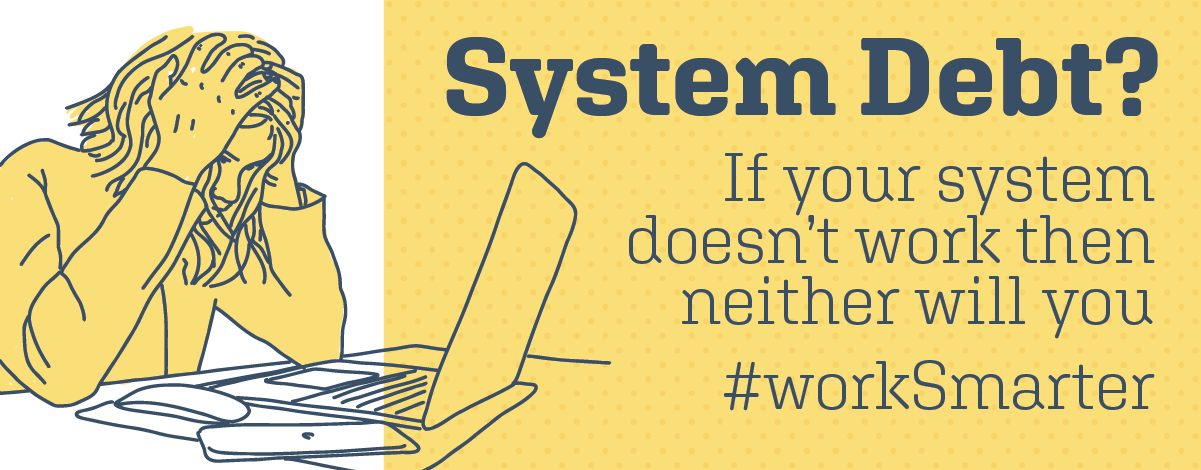If Work Processes Lead to Stress, is it Time to Consolidate or Pay Off Your System Debt
It is difficult to start new roles or projects without causing problems that you'll need to come back and fix at a later date. As you work fast to learn a new role or start a new business or project, good enough is often satisfactory if it gets you to the next step. New product and service teams use the term technical debt to describe the cost of choosing quick and convenient off-the-shelf solutions (typically bits of software or design templates) because doing it 'properly', building from scratch would be too costly during the start-up stage. Inevitably, though, the debt needs to be settled. Sooner or later, the job must be done properly (usually once you're beyond the prototype phase, off the ground and running).

Consider this: a similar debt might be lurking in your own work systems, whether you're working independently or as part of a team. We often opt for quick solutions, especially in areas like communication, work capacity organisation, and expectations, just to get things moving. But once we're up and running, we rarely find the time to revisit and improve these compromised system parts, even though it could greatly benefit us.
In Day Crafting, I call this system debt * The system is everything from productivity processes and flows to the working environment, schedules and even other people.
Are you suffering from system debt? I'm imagining the following in a TV infomercial voice: If you have communication overload with unmanageable email or message volumes, unread emails, unreturned calls, and missed messages piling up, leading to a backlog that becomes harder to manage over time, or you're over capacity with tasks accumulating faster than you can process them, this is a clear sign of system debt. If you're tired, busy, unmotivated, low on energy, etc ... you get the point. System debt can lead to burnout, decreased productivity and a general sense of overwhelm.
So, what's the solution? Instead of resorting to drastic measures like declaring system bankruptcy (yes, some people do slay the inbox dragon and delete everything when their unread inbox hits 10,000+), we can consider a more practical approach: something like a system debt consolidation plan. Day Crafting, with its small yet consistent steps, is a great tool for this.
Here's how the system debt consolidation plan works. It could be a weekly or monthly review of your work or productivity systems (explored more in the Productivity Workbook). Next, start implementing specific fixes and system improvements. This might involve updating your communication tools, streamlining your work processes, or setting clearer expectations with others. Finally, review your progress and repeat the cycle. The key is to prevent the debt from piling up again.
Depending on your system, you might be surprised at the results of small, quick fixes such as simplifying tasks, defragmenting your schedule, and implementing more precise rules about what you say yes to. For instance, setting a limit on the number of meetings you attend in a day or using a task management tool to prioritize your work. Or you might want to be more radical and become harder to find by putting some friction between people demanding your attention and your schedule or even row back on some supposedly marvellous technologies like email, push notifications and 24/7 connectivity. For example, email, as a way to organise work, agendas, and information requests, was always going to be in the system debt category. There are much better ways. You may find the workbook a useful resource.
I'm working on this very problem with several Day Crafting Apprentices in 1:1 sessions. If you're interested in working on this and getting some help, please get in touch.
* page 29 of Day Crafting: The Productivity Workbook.
Written by Bruce Stanley on Mon, May 27, 2024
Please share this
Related posts
Only a minority of people actually review their course
Are you off course? This is an especially relevant question if you're in new territory or if you're making a new thing and more often than not, we are in that situation. Even if we think we're doing the same thing, the world around us is volatile and constantly changing. How does the opening question help? It helps in that the more often you review your direction and signs of progress, the more often you can course correct potentially saving you from using resources you would otherwise waste and the associated frustrations.
[It turns out that not many people do this very often]
Scheduling Tools to Preempt Busy Reactive Days
Does your work system feel more like A or B?| A | B |
|---|---|
|
|
Redefined riches, the true currencies of your day
It might feel like you're making it up as you go along, but that's not really true. Beneath our actions and choices are rules we follow to make decision-making easier and save cognitive bandwidth (some refer to these, laudably, as values). Much of this habitual functionality is fine, but if you wonder how you got so tired or stressed or so far away from what seems meaningful in your days – this automatic behaviour could be the place to Day Craft.
